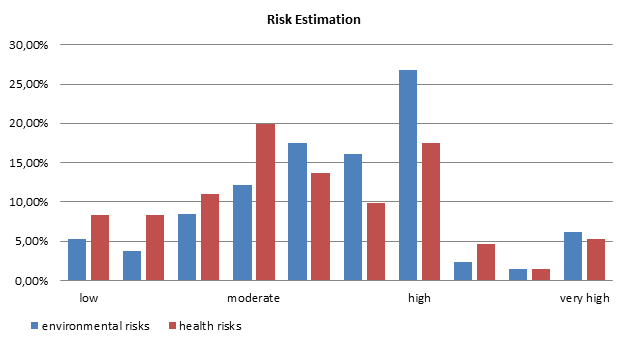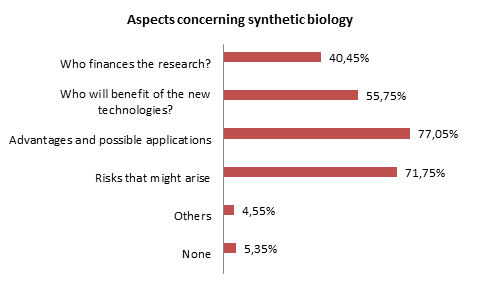Team:Freiburg/PolicyAndPractices/survey
From 2014.igem.org
What do people know about Synthetic Biology? - An Evaluation
Intention
With our online survey we aimed to statistically asses, what people know about the new field of synthetic biology, what concerns they have and which approach we could choose to address existing problems. The survey was intended for a wide range of participants of all ages, both genders and various education qualifications.
Evaluation
Few people knew about Synthetic Biology
Evaluation showed that the majority of respondents are uninformed about synthetic biology. Although 56.6% declare to have an educational degree in the field of science, only 41.8% say that they know what synthetic biology is.

Figure 2: Knowledge about Synthetic Biology.
When asked if they have heard about ‘Synthetic Biology’, less than a half of respondents knew what synthetic biology is.
Concerns regarding safety issues are prevalent
Results indicate that new technologies, such as synthetic biological applications are encountered with distrust, especially when it comes to safety issues. Figure 3 illustrates how consulted persons rate the risks that are associated with genetically modified organism. Risks that might harm the environment are perceived to be higher than risks concerning health aspects. Overall, risks are mainly ranked between ‘moderate’ and ‘high’.

Figure 3: Risk Estimation.
Risks concerning environmental aspects are to 26.75% rated as high, while risks that might influence the health of humans is to 19.85% considered as moderate.
Worries about safety measurements become also evident, when people are asked which aspects concerning synthetic biology they would like to learn more about. 71.75% are interested in risks that might arise of synthetic biological applications (see Fig. 4).
Demand for more information about Synthetic Biology
Despite all these concerns, people generally express great interest for synthetic biology and wish to be informed about advantages and possible applications, about ethical questions, such as who will benefit of new technologies and about financing.

Figure 4: Aspects concerning Synthetic Biology.
When asked what aspects concerning synthetic biology people would like to learn more about, respondents were mainly interested in advantages, possible applications and in risks that might arise.
Provided that all people would be able to benefit of new technologies, even those with few financial means, and under strict safety measures to protect the environment, 47% and 49%, respectively, would support novel applications that include genetically modified organisms.
Further, the fact that most people believe that synthetic biology will rather have a positive influence on the way we live is particularly encouraging.
Figure 5: Acceptance towards synthetic biological applications. Results of the question: ‘Currently, production of an essential pharmaceutical component for treatment of Malaria is expensive and time consuming. Scientists have now succeeded in developing genetically engineered yeast cells, which produce large amounts of this component in specific reactors. Would you support such a production process?’

Summary
It can be summarized, that there are significant concerns about safety and security issues in the population. However, people do see the potential of synthetic biology and show interest, especially regarding safety measures and novel applications. In general, people are open-minded and unbiased, which should be seized as an opportunity for gaining more acceptance by informing about safety measures and assuming more responsibility for biosafety aspects.
 "
"



